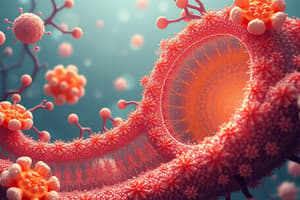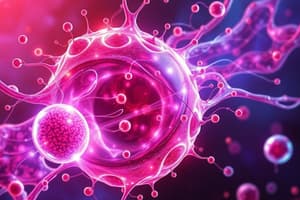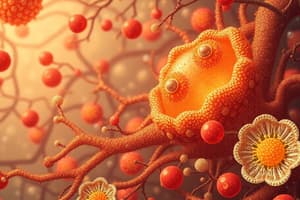Podcast
Questions and Answers
What is the role of SNAREs in membrane trafficking?
What is the role of SNAREs in membrane trafficking?
Which of the following is NOT a component involved in vesicular transport?
Which of the following is NOT a component involved in vesicular transport?
What mechanism do cells use to uptake large particles through endocytosis?
What mechanism do cells use to uptake large particles through endocytosis?
Where do proteins synthesized in the rough endoplasmic reticulum primarily go next?
Where do proteins synthesized in the rough endoplasmic reticulum primarily go next?
Signup and view all the answers
What is the main function of the Golgi apparatus in the context of membrane trafficking?
What is the main function of the Golgi apparatus in the context of membrane trafficking?
Signup and view all the answers
What is the significance of coat proteins in vesicle transport?
What is the significance of coat proteins in vesicle transport?
Signup and view all the answers
Which of the following correctly describes receptor-mediated endocytosis?
Which of the following correctly describes receptor-mediated endocytosis?
Signup and view all the answers
How does vesicular transport maintain the asymmetry of the lipid bilayer?
How does vesicular transport maintain the asymmetry of the lipid bilayer?
Signup and view all the answers
What is the primary function of the Golgi apparatus?
What is the primary function of the Golgi apparatus?
Signup and view all the answers
Which component is directly involved in selective transport to the Golgi complex?
Which component is directly involved in selective transport to the Golgi complex?
Signup and view all the answers
What does the trans Golgi Network (TGN) sort traffic for?
What does the trans Golgi Network (TGN) sort traffic for?
Signup and view all the answers
In which pathway is the Golgi apparatus involved when sorting secretory components?
In which pathway is the Golgi apparatus involved when sorting secretory components?
Signup and view all the answers
Where does the modification and sorting of proteins mainly occur?
Where does the modification and sorting of proteins mainly occur?
Signup and view all the answers
Which organelle is known for containing digestive enzymes?
Which organelle is known for containing digestive enzymes?
Signup and view all the answers
Which process does NOT occur at the Golgi apparatus?
Which process does NOT occur at the Golgi apparatus?
Signup and view all the answers
What type of sacs comprise the Golgi apparatus?
What type of sacs comprise the Golgi apparatus?
Signup and view all the answers
What role do Rab GTPases serve in cellular transport?
What role do Rab GTPases serve in cellular transport?
Signup and view all the answers
Which statement about SNAREs in membrane fusion is accurate?
Which statement about SNAREs in membrane fusion is accurate?
Signup and view all the answers
What is the primary function of the molecular motors in vesicle transport?
What is the primary function of the molecular motors in vesicle transport?
Signup and view all the answers
What happens to v-SNAREs after they participate in membrane fusion?
What happens to v-SNAREs after they participate in membrane fusion?
Signup and view all the answers
What role do ATP-hydrolysis play in the functioning of SNAREs?
What role do ATP-hydrolysis play in the functioning of SNAREs?
Signup and view all the answers
Which process is primarily driven by SNARE proteins?
Which process is primarily driven by SNARE proteins?
Signup and view all the answers
What is the result of Rab GTPase activation?
What is the result of Rab GTPase activation?
Signup and view all the answers
Which of the following is NOT a function of the Rab GTPases?
Which of the following is NOT a function of the Rab GTPases?
Signup and view all the answers
What role do lysosomal enzymes play in the cell?
What role do lysosomal enzymes play in the cell?
Signup and view all the answers
Why is the lumen of lysosomes acidic?
Why is the lumen of lysosomes acidic?
Signup and view all the answers
At what pH do lysosomal enzymes function optimally?
At what pH do lysosomal enzymes function optimally?
Signup and view all the answers
What is one way endocytosis is exploited by viruses?
What is one way endocytosis is exploited by viruses?
Signup and view all the answers
Which of the following is NOT a virus that utilizes endocytosis for entry into cells?
Which of the following is NOT a virus that utilizes endocytosis for entry into cells?
Signup and view all the answers
What is the term used for the enzymes found in lysosomes that break down biological molecules?
What is the term used for the enzymes found in lysosomes that break down biological molecules?
Signup and view all the answers
What is a key function of membrane transporters in lysosomes?
What is a key function of membrane transporters in lysosomes?
Signup and view all the answers
What do viruses like the coronavirus and HIV have in common regarding entry mechanisms?
What do viruses like the coronavirus and HIV have in common regarding entry mechanisms?
Signup and view all the answers
What role does the LDL receptor play in endocytosis?
What role does the LDL receptor play in endocytosis?
Signup and view all the answers
What occurs if the endosome’s pH is neutralized to 7?
What occurs if the endosome’s pH is neutralized to 7?
Signup and view all the answers
Which component is critical for the formation of clathrin-coated pits during receptor-mediated endocytosis?
Which component is critical for the formation of clathrin-coated pits during receptor-mediated endocytosis?
Signup and view all the answers
What is the primary purpose of endocytosis in cellular processes?
What is the primary purpose of endocytosis in cellular processes?
Signup and view all the answers
What is the typical pH range found in early endosomes?
What is the typical pH range found in early endosomes?
Signup and view all the answers
What happens to receptors after they have internalized particles such as LDL?
What happens to receptors after they have internalized particles such as LDL?
Signup and view all the answers
Endocytosis can be specifically characterized by which of the following mechanisms?
Endocytosis can be specifically characterized by which of the following mechanisms?
Signup and view all the answers
Which of the following describes the process of receptor-mediated endocytosis (RME)?
Which of the following describes the process of receptor-mediated endocytosis (RME)?
Signup and view all the answers
What is the primary function of cargo adaptors in vesicle transport?
What is the primary function of cargo adaptors in vesicle transport?
Signup and view all the answers
Which coat protein is associated with vesicles that transport cargo from the Endoplasmic Reticulum to the cis-Golgi?
Which coat protein is associated with vesicles that transport cargo from the Endoplasmic Reticulum to the cis-Golgi?
Signup and view all the answers
What role do coat proteins play in vesicle formation?
What role do coat proteins play in vesicle formation?
Signup and view all the answers
Which of the following transport pathways involves the recycling of cargo receptors back to the Endoplasmic Reticulum?
Which of the following transport pathways involves the recycling of cargo receptors back to the Endoplasmic Reticulum?
Signup and view all the answers
Cargo that travels from the plasmic membrane to the early endosome is primarily associated with which coat proteins?
Cargo that travels from the plasmic membrane to the early endosome is primarily associated with which coat proteins?
Signup and view all the answers
What defines the protein composition of transport vesicles in cellular transport?
What defines the protein composition of transport vesicles in cellular transport?
Signup and view all the answers
What does the term ‘COP’ signify in the context of cargo and adaptation mechanisms?
What does the term ‘COP’ signify in the context of cargo and adaptation mechanisms?
Signup and view all the answers
Why might many cargos have more than one sorting signal?
Why might many cargos have more than one sorting signal?
Signup and view all the answers
Study Notes
Membrane Trafficking: Secretory and Endocytic Pathways
- Proteins synthesized on the endoplasmic reticulum (ER) have specific destinations
- Vesicle transport moves materials between membrane-bound compartments
- Coat proteins, adaptors, SNARES, tethers, and Rab proteins are crucial for membrane trafficking
- The Golgi apparatus plays a role in protein processing and sorting
- Receptor-mediated endocytosis is a mechanism for taking up specific molecules, like LDL
- Phagocytosis allows cells to take up large particles
- Vesicle transport is selective, only certain specific proteins are incorporated into transport vesicles
- The asymmetry of the lipid bilayer is preserved during vesicle transport, as is the orientation of membrane proteins
- The lumen of the ER, the lumen of transport vesicles, and the lumen of the Golgi correspond topologically to the outside of the cell
- Regions of proteins with N-linked glycosylation are on the lumenal side and therefore topologically on the outside of the cell
- Topics include overview of membrane trafficking pathways, mechanisms of vesicle budding, movement, tethering and fusion, the Golgi apparatus, endocytosis, and lysosomes and autophagy
- Proteins destined for secretion, delivery to the lysosome, or to be resident proteins have an ER signal sequence
Vesicle Transport: Budding and Fusion
- Vesicles bud from donor compartments, move, fuse with acceptor compartments
- Cargo proteins are selectively moved from one membrane to another
- Coat proteins, adaptors, vesicle tethers, and motor proteins play a role in budding, movement, tethering, fusion
Vesicle Budding: Cargo Selection and Membrane Shaping
- Lumenal cargo selection is mediated by cargo receptors
- Cargo adaptors bind to sorting signals in cargo receptor cytoplasmic tails and capture transmembrane protein cargos, including receptors
- Coat proteins bind to adaptors, shaping the membrane into a vesicle
- Vesicle formation involves pinching from membrane
"Coated" Vesicle Transport Pathways
- Coats and their associated adaptors define the protein composition of transport vesicles
- COPII vesicles transport materials from the ER to the Golgi
- COPI vesicles recycle cargo receptors to the ER
Movement
- Vesicles and organelles move along microtubules using molecular motors like cytoplasmic dynein and kinesins
Tethering
- Rab GTPases recruit tethering proteins, mediating docking, and positioning vesicles for fusion
Fusion
- SNAREs (v-SNAREs and t-SNAREs) drive the fusion of transport vesicles with target membranes
- "Tethering" and "zipper formation" of SNAREs occur
- SNARE disassembly is ATP-dependent
The Golgi Apparatus
- The Golgi apparatus (Golgi complex) is a stack of flattened, membrane-enclosed sacs called cisternae
- It functions in protein modification, glycosylation (N-linked oligosaccharides), and sorting of proteins to various destinations
- Sorting occurs in the trans Golgi network (TGN)
Secretory Pathways (Constitutive and Regulated)
- Newly synthesized proteins and membrane lipids are sorted in the trans Golgi network (TGN) for constitutive or regulated exocytosis
- Constitutive secretion is a continuous process
- Regulated secretion depends on signals triggered by extracellular factors
- "Secretory granules" are vesicles storing concentrated secretory proteins
- The TGN sorts traffic to multiple destinations
Endocytosis
- Endocytosis is the taking-in of materials from the extracellular space via membrane invagination
- Receptor-mediated endocytosis is a process utilizing specific receptors for uptake of materials
- Low-density lipoprotein (LDL) receptor-mediated endocytosis (RME) is an example of how cholesterol is transported
Lysosomes
- Lysosomes are membrane-bound organelles containing acid hydrolases optimally functioning at an acidic pH.
- Lysosomes break down biological molecules; their acidic lumen is essential for their function
- Membrane transporters in lysosomes recycle products of degradation
Diseases Related to Mutated Membrane Trafficking Proteins
- Mutations in membrane trafficking proteins can lead to various diseases affecting different body systems
Studying That Suits You
Use AI to generate personalized quizzes and flashcards to suit your learning preferences.
Related Documents
Description
Explore the complex processes involved in membrane trafficking, focusing on secretory and endocytic pathways. This quiz covers key concepts such as vesicle transport, Golgi apparatus function, and mechanisms like receptor-mediated endocytosis and phagocytosis. Test your understanding of how proteins are synthesized and sorted within cellular environments.




